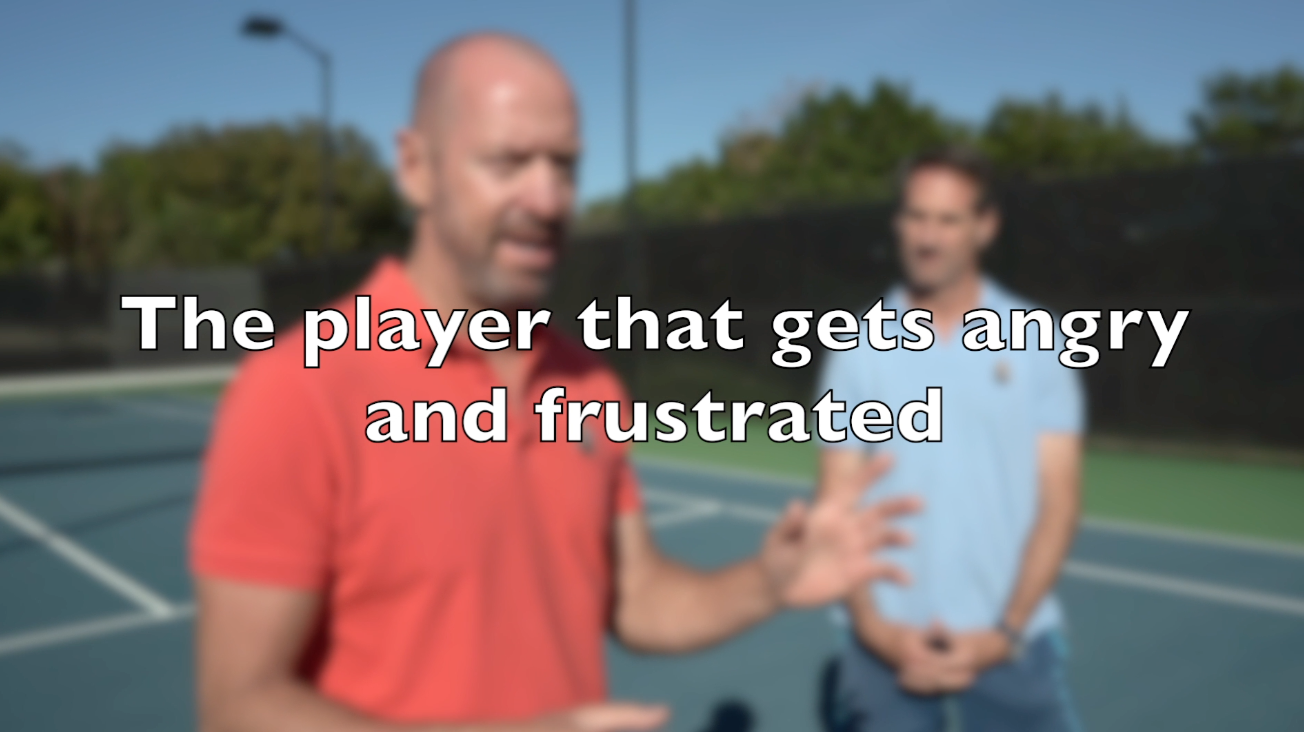G’day,
Hands up if you find yourself getting too emotional in matches? In particular, hands up if the emotions that you feel are frustration and anger?
All over the world, at all levels of our sport, this is a universal predicament. It is quite possibly the most common way we express our emotions negatively on the court, and it is also the most common way we tap out of matches and quit. We become our own worst enemy and defeat ourselves. Once the anger kicks in you can’t even see straight, let alone see your opponent on the other side of the net and formulate a winning game plan against them.
The following video is a small snapshot of what Getting Tight is all about. Watch the three-minute video and you will get a good feel for how Craig and Jeff coach this global problem.
Getting Tight Excerpt: Anger & Frustration.
Nine Mini-Lessons
Jeff and I expand on the key focus points in the video to provide more depth and understanding of what we talked about.
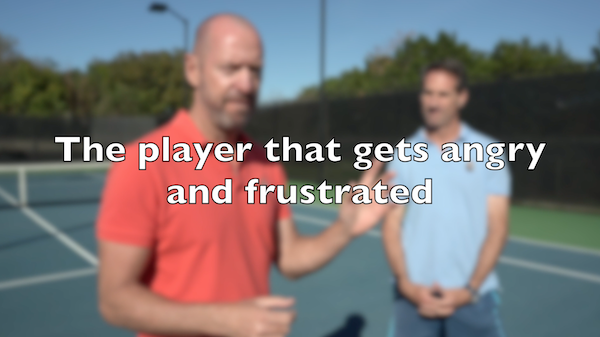

-
Decide that you aren’t going to let your emotions or thoughts “run the show.”
-
Accept the fact that errors will happen, that you will get frustrated and then widen your focus.
-
I often found that looking up at the sky or finding a tree helped to take my mind off the last mistake for a moment.
-
Coach yourself to think about how fortunate you are to be playing tennis.
-
Gratitude is a great remedy for negative emotions.
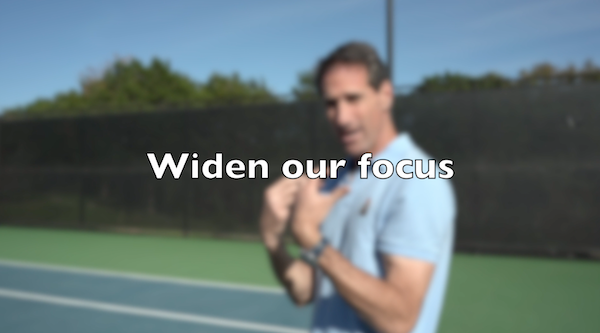

- Research shows that the best performers in the world have the ability to narrow their focus under pressure when they are in the phase of execution.
- For example, immediately before returning serve elite players are completely focused on the ball toss of the server with no thoughts.
- However, when you are emotional, you need to do the opposite. Instead of letting the emotions control you, take your eyes off the court, expand your field of vision, and disconnect from the moment. Find a tree, look to the sky, and disconnect from the error.
- This widening of your focus will activate what is called the parasympathetic response, which is the fire extinguisher that will help you regain your composure.
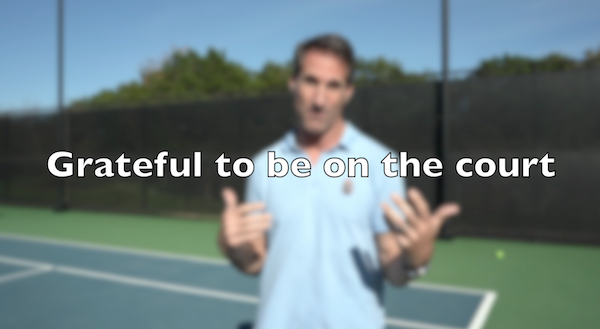

- Gratitude is a very powerful mindset and it can shift your negativity into something positive in seconds.
- It is key to feel this genuinely and put this match into perspective.
- This is not a feeling that will come naturally. You must reflect on the fact that you will play many matches in your life and it is the learning that is most important so you can reach your highest potential.
- Your mind will be consumed by your desire to win and not lose, but you must take control of your emotional state and choose to appreciate the challenge you’re facing at the moment.
- If some missed forehands are your greatest problem, you have already won the game of life!
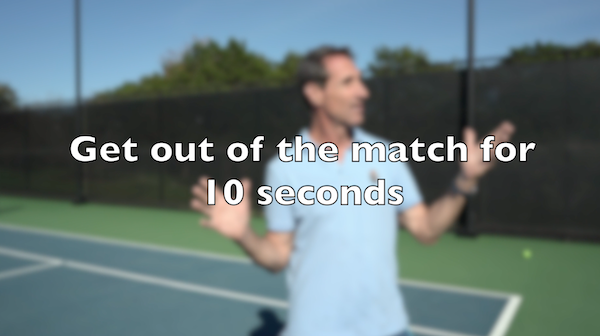

- Sometimes you will need a bit of a longer “reset” so give yourself the time to adjust your emotional “state.”
- Sometimes your focus will get too narrow which will fatigue your brain and take energy away from strategy.
- Give yourself time to go to your towel, recall a favorite place that creates positive memories (Jeff often use the beach in very difficult moments).
- Imagine yourself in a positive, loose state having fun (quick image in your mind). This proactive action will help you keep your emotions in check so you don’t go down the emotional “rabbit hole.”
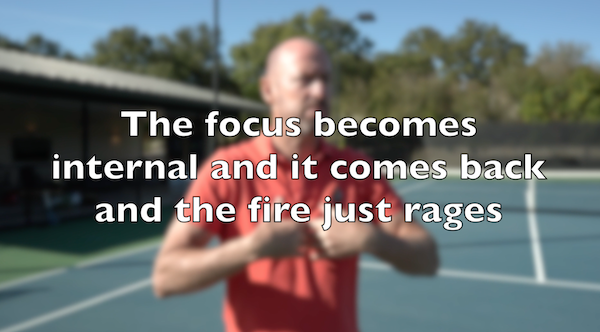

- The more you focus on yourself, the tighter and more frustrated you will become.
- The judgment and self-criticism will contribute to your anger.
- When you get your attention off yourself and stop trying to be perfect you will feel freer and not so controlled by your expectations.
- To practice this, turn your attention to your strategy and combination of shots that you have trained and focus on the task at hand.
- Additionally, focusing on external “cues” such as the ball, the ground and the strings. This will help you get out of “yourself” and into the game.
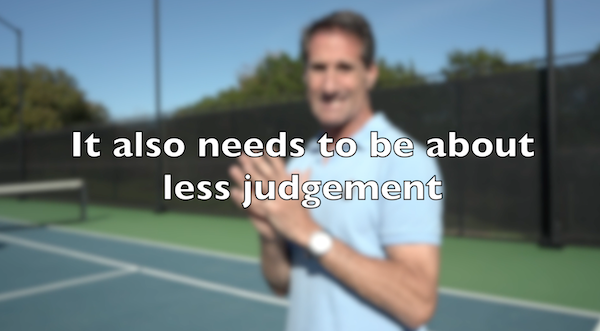

- We tend to judge everything that happens.
- This was hardwired into our brains to avoid danger.
- The tendency to criticize and obsess over mistakes is universal.
- It is certainly okay and sometimes helpful to give yourself a quick reminder with a cue like “forward”, “stay down” or, better yet, picture it in your mind.
- Recognize your tendency to judge each shot and diminish this self-defeating part of your game.
- You are probably doing it more than you think.
- It is also okay to just move on and not judge every shot you hit.
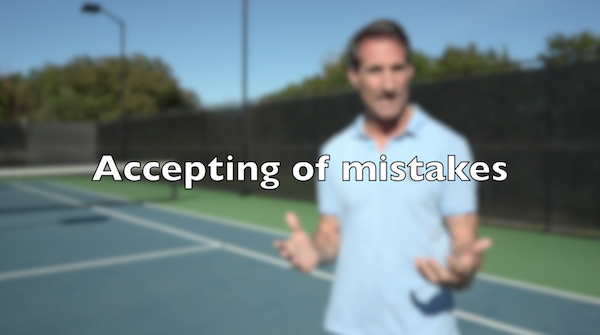

-
Mistakes feel horrible for young players. They have not yet figured out good errors lead to good shots.
-
Nobody likes to miss, especially on balls you know you can make.
-
The frustration, anger, and fear are instantaneous.
-
Without taming the lion within you, these emotions can run rampant. To change this habitual response, it is best to replace these moments with something practical and constructive—like breathing.
-
Build the following breath into your game: 1 deep breath in through your nose for a count of 6, hold for one second and exhale out through your mouth for a count of 6 seconds.
-
Practice this at home so it becomes natural and truly does relax you.
-
You can shorten this breath after mistakes if you like as long as you are breathing properly as you have practiced.
-
Commit to using this breath after mistakes to help you stop the fire from spreading.
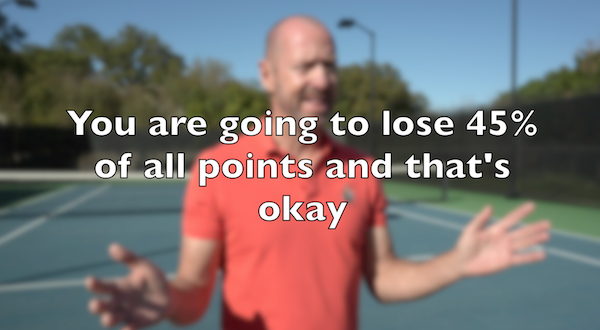

-
Remember that you are fighting over just about 10% of the points in any match.
-
You do not need to win every point. Accepting errors and “turning the page” after the point is very important.
-
The reality is that you are going to miss a certain amount of serves, returns, groundstrokes, and volleys.
-
Some will be shots that you consider are “easy” and “makable” balls you “shouldn’t” miss, which create the most frustration, but these errors will happen, too.
-
Errors happen at all levels of the game. It doesn’t mean you are going to lose the match or that you even need to change your tactic.
-
Stay calm and assess your mental and physical state and tactical patterns, which you can do on the changeover when necessary.
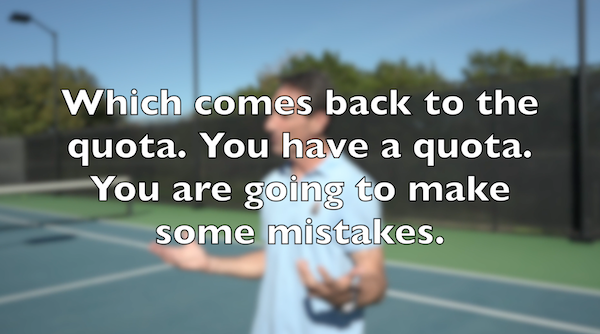

-
I don’t necessarily say that I’m going to miss a certain number of shots before the match, but I have complete awareness and acceptance that I will miss many shots in the course of a match.
-
Feel like you have got an acceptable “quota” of mistakes that you are giving yourself. Something that is based on reality, and still enables you to win the set or match.
-
Give yourself a quota and see if that reduces the fire that is brewing behind the door.
I hope you enjoyed this sneak-peek under the hood of Getting Tight. The course launches Monday, April 13.
All the best,
Craig

